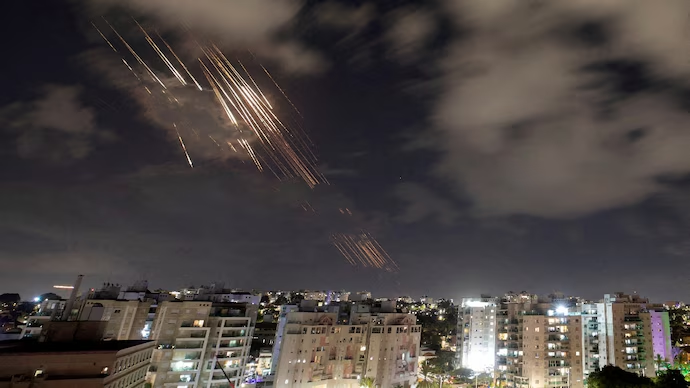Israel and Iran Edge Closer to Conflict as Tensions Escalate

The Middle East stands on the brink of a significant conflict, as Israel and Iran face escalating tensions. Following Iran’s ballistic missile strikes on Israel, both nations are preparing for further military action. Israel’s Prime Minister Benjamin Netanyahu has made it clear that Iran’s actions will not go unanswered, raising fears of a broader regional conflict with global economic consequences.
Rising Tensions in the Middle East
Israel has always maintained a robust defense system, but the recent escalation with Iran has reached new heights. In the past few days, over 180 ballistic missiles were launched at Israel, yet no casualties were reported. Israel’s highly efficient warning systems and its well-prepared citizens have kept the nation safe from this onslaught, despite the seriousness of the attack. As Netanyahu stated, “Iran has made a grave mistake.”

The efficiency of Israel’s civil defense measures played a crucial role. Citizens were immediately alerted to take shelter in bomb-proof bunkers strategically located across major cities. These bunkers, designed for large-scale missile attacks, have been pivotal in ensuring zero casualties during this conflict.
Iran’s Calculated Risks
Iran’s recent actions are seen as a calculated risk, potentially a response to ongoing geopolitical struggles in the region. Speculation has grown about Israel’s potential counterstrike, especially targeting Iran’s oil infrastructure. Analysts believe that a strike on Iran’s oil storage facilities could have profound effects on the global economy.
“If Israel targets Iran’s oil infrastructure, it won’t just hurt Iran—it will shake global oil markets,” one energy analyst predicted. The destruction of Iran’s oil reserves could prevent the nation from bypassing sanctions and selling oil to countries like China, a move that would cripple Iran’s already strained economy.
Israel’s Strategic Defense and Response
Israel is known for its military prowess, but its defense strategy goes beyond missiles and fighter jets. It leverages a network of bunkers and underground facilities that have been vital in the past, such as during the COVID-19 pandemic. These shelters, now once again serving their purpose, demonstrate Israel’s preparedness for both military and civil defense.
Israel Bans UN Secretary-General Antonio Guterres Amid Rising Tensions
While no casualties were reported during this missile attack, Israel’s vulnerability to other forms of aggression remains. On October 7th, the country saw a significant terrorist attack that claimed 1,200 lives, highlighting the ongoing internal and external threats it faces. Despite its strong military and intelligence networks, Israel’s civilian population remains a target for various groups.
A History of Retaliation
Israel’s military capabilities are unmatched in the region. In the past, it successfully destroyed Iran’s S-300 missile defense systems, provided by Russia, using its state-of-the-art F-35 fighter jets. Speculation is growing that Israel might take similar action soon.
“Israel has the capability to decimate Iran’s missile defenses without much warning,” noted a defense analyst. This could serve as a powerful message to Iran, signaling that Israel can strike at will without fearing significant retaliation.
Israel’s current focus, however, seems to be Iran’s oil storage facilities, rather than its nuclear program. While the latter remains a significant threat, Israel understands that a strike on Iran’s oil infrastructure could have far-reaching implications. In recent years, Iran has struggled to sell oil on the international market due to heavy sanctions. A successful attack on its storage facilities would eliminate even the slightest possibility of future sales, creating billions of dollars in losses for the Iranian government.
The Global Ramifications
Should Israel proceed with such a strike, the repercussions would not be limited to the Middle East. The global economy, already fragile due to various geopolitical tensions, could face further disruptions. The oil market, in particular, would be hit hard, leading to a potential rise in global oil prices.
The United States has already signaled its support for Israel by deploying guided missile submarines to the region. This move highlights the seriousness of the situation and suggests that the U.S. is preparing for possible escalations. The mere presence of these submarines is a clear warning to Iran, showing that the U.S. stands ready to back Israel in any military confrontation.
What’s Next for Israel and Iran?
The coming days are crucial. With U.S. submarines on the move and Israel poised for retaliation, the entire region could be drawn into a larger conflict. Iran’s ability to launch more missiles, as some analysts suggest, remains a possibility, but for now, it appears that Iran is playing a defensive game.
Israel, on the other hand, is not one to back down. In the face of aggression, the nation has a history of responding forcefully. Netanyahu’s statements leave little doubt that Israel is planning a counterattack. What form this will take, whether a strike on Iran’s oil reserves or a more direct attack on its nuclear program, remains to be seen.
The international community is watching closely, and the next steps could reshape the political landscape of the Middle East for years to come.






One Comment